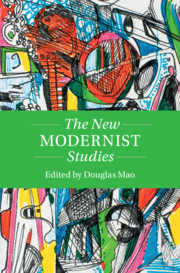Book contents
- The New Modernist Studies
- Twenty-First-Century Critical Revisions
- The New Modernist Studies
- Copyright page
- Dedication
- Contents
- Figures
- Notes on Contributors
- Acknowledgments
- Introduction
- I Histories
- II Horizons
- Chapter 3 Planetarity’s Edges
- Chapter 4 Religion’s Configurations
- Chapter 5 Disability’s Disruptions
- Chapter 6 Affect’s Vocabularies
- Chapter 7 Invisibility’s Arts
- Chapter 8 Black Writing’s Visuals
- Chapter 9 Noir Film’s Soundtracks
- Chapter 10 Language’s Hopes
- Chapter 11 Revolution’s Demands
- Chapter 12 Feminism’s Archives
- Chapter 13 Risk’s Instruments
- Chapter 14 Deep Time’s Hauntings
- Bibliography
- Index
Chapter 8 - Black Writing’s Visuals
African American Modernism in Nugent, Ligon, and Rankine
from II - Horizons
Published online by Cambridge University Press: 21 January 2021
- The New Modernist Studies
- Twenty-First-Century Critical Revisions
- The New Modernist Studies
- Copyright page
- Dedication
- Contents
- Figures
- Notes on Contributors
- Acknowledgments
- Introduction
- I Histories
- II Horizons
- Chapter 3 Planetarity’s Edges
- Chapter 4 Religion’s Configurations
- Chapter 5 Disability’s Disruptions
- Chapter 6 Affect’s Vocabularies
- Chapter 7 Invisibility’s Arts
- Chapter 8 Black Writing’s Visuals
- Chapter 9 Noir Film’s Soundtracks
- Chapter 10 Language’s Hopes
- Chapter 11 Revolution’s Demands
- Chapter 12 Feminism’s Archives
- Chapter 13 Risk’s Instruments
- Chapter 14 Deep Time’s Hauntings
- Bibliography
- Index
Summary
This essay examines the conditions of African American modernism in the twenty-first century. How does a new black modernism differ from an earlier black modernist period commonly associated with the New Negro Movement of the 1920s? Moving briefly from Richard Bruce Nugent’s 1926 short story, “Smoke, Lilies, and Jade” to two significant portrayals of a new black modernism by the visual artist Glenn Ligon and the poet Claudia Rankine, the essay considers how Ligon’s text-based paintings and Rankine’s poetry in Citizen play with the dynamic of image and text that has been so productive for black modernism. In particular, Rankine’s use of Ligon’s text-based paintings in Citizen helps the poet depict the subtle, subjective shift that occurs when difference, however defined, “enters the American landscape.”
Keywords
- Type
- Chapter
- Information
- The New Modernist Studies , pp. 167 - 180Publisher: Cambridge University PressPrint publication year: 2021

